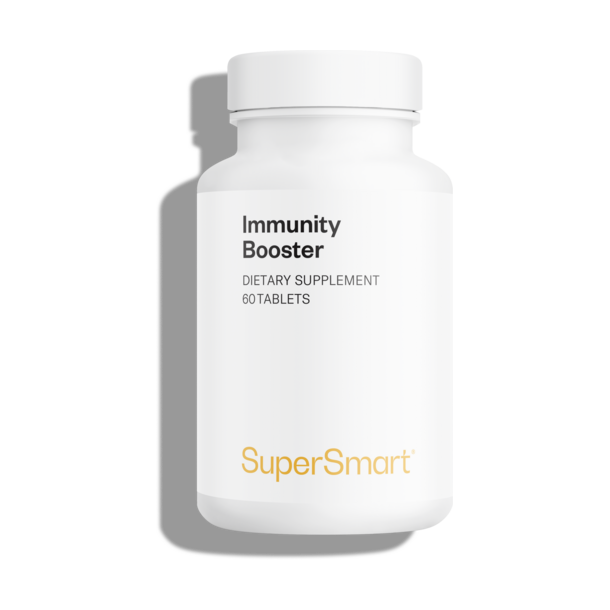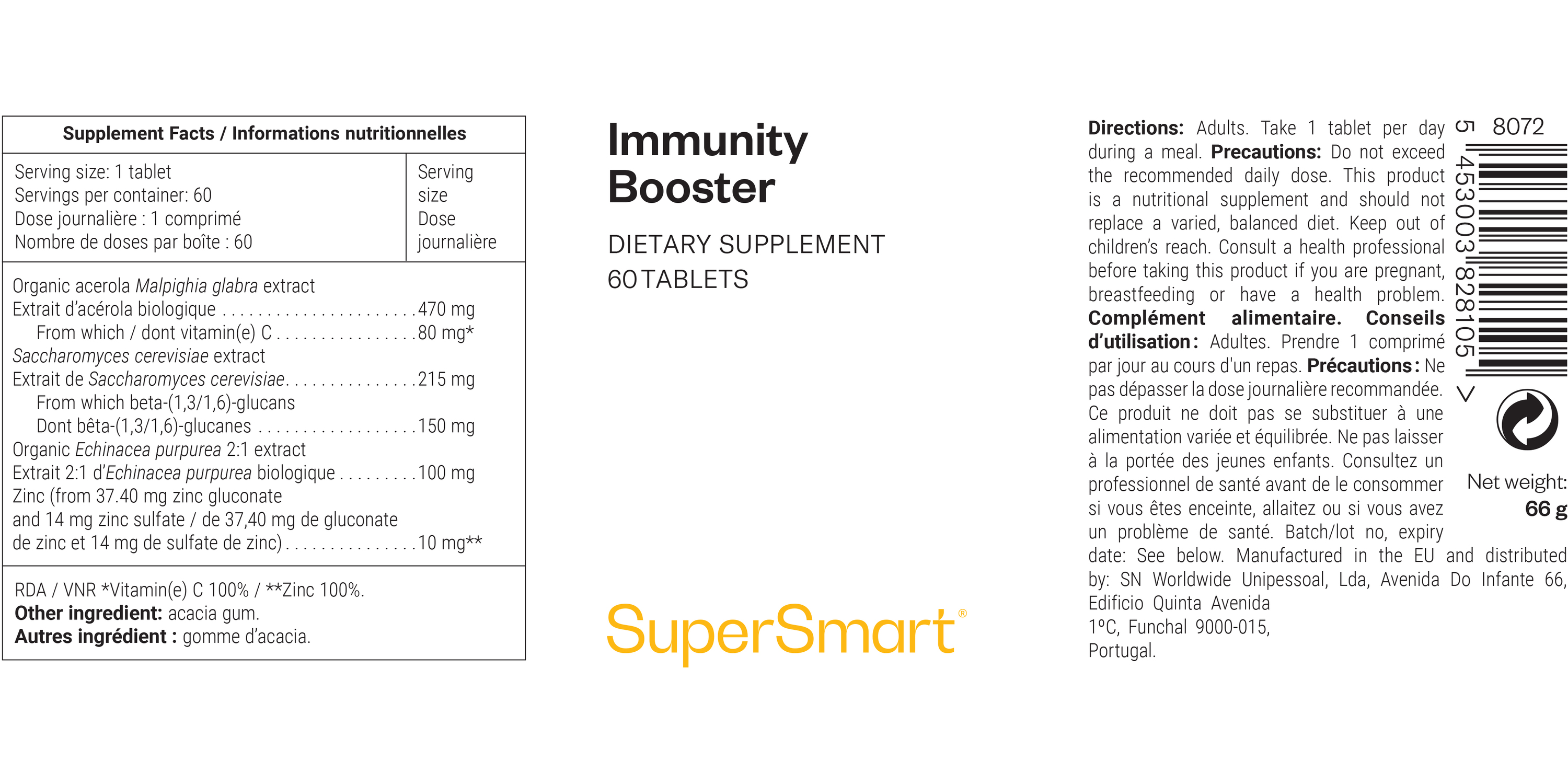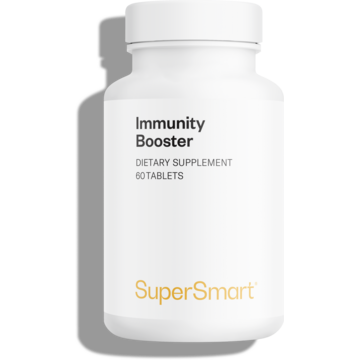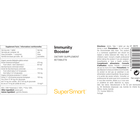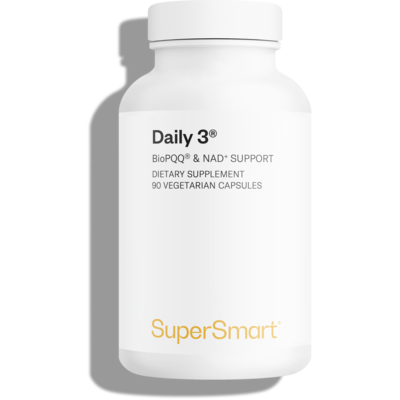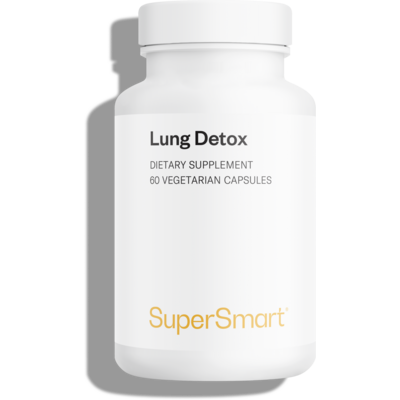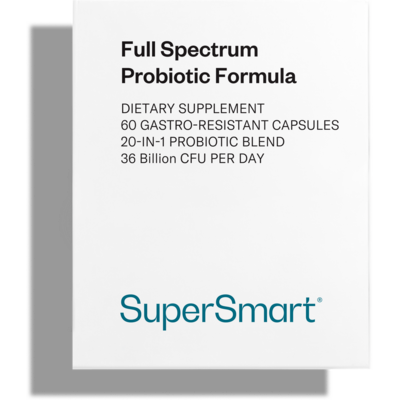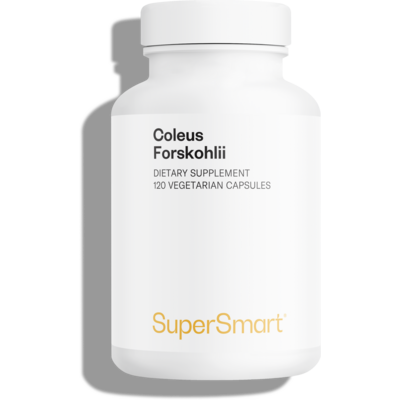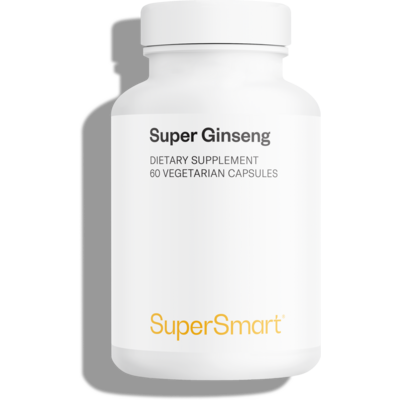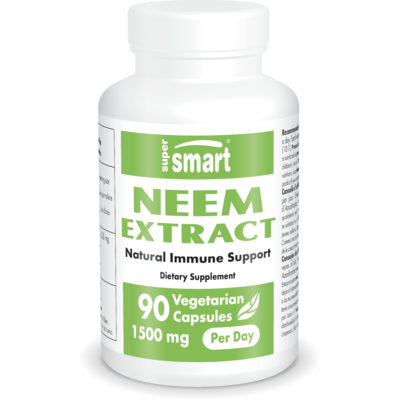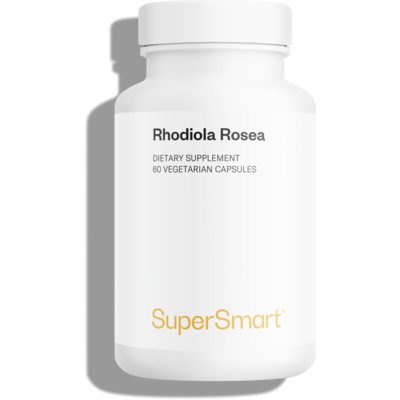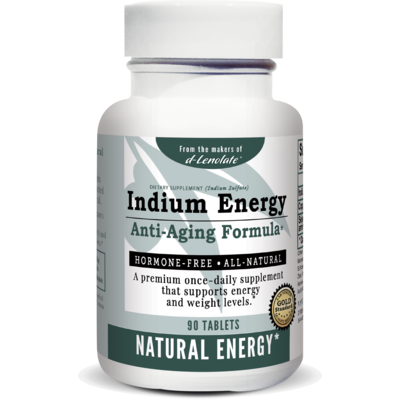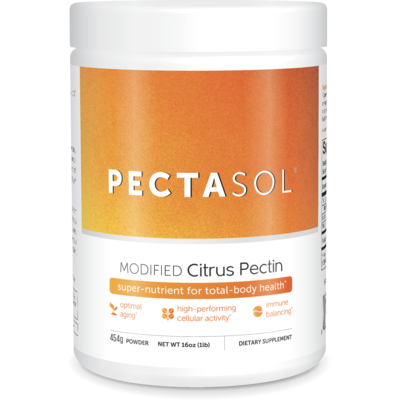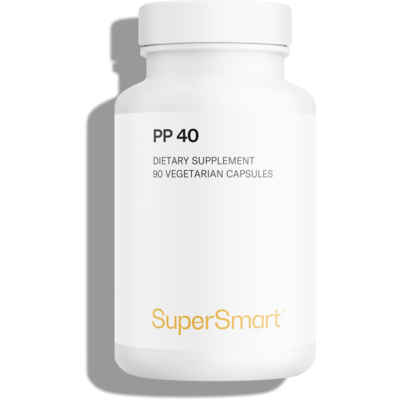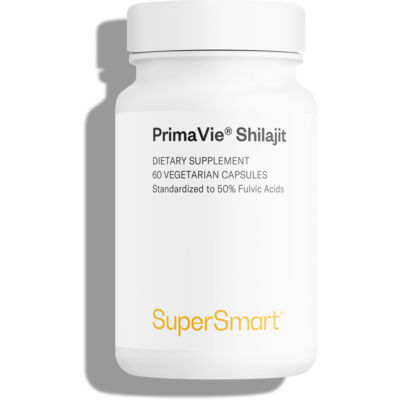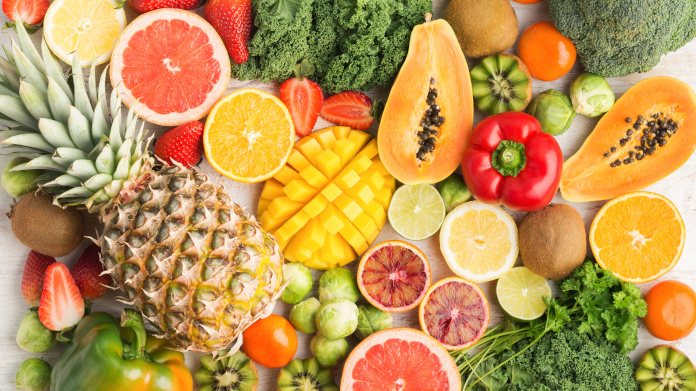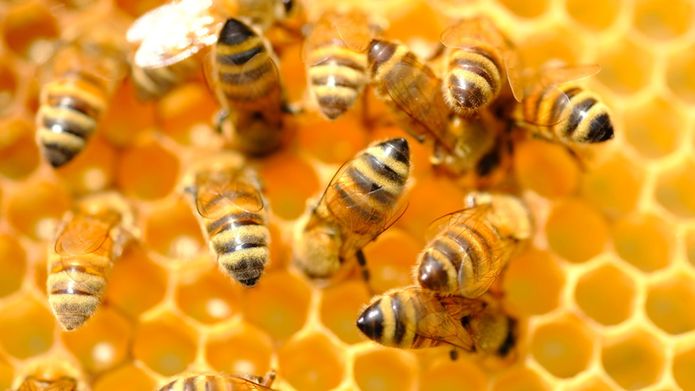Immunity Booster is a dietary supplement of exceptional quality formulated to help boost immune defenses. It has been carefully developed over a long period by the SuperSmart team.
This brand new formulation combines an extract of organic echinacea (a medicinal plant known to both support the body's natural defense system and help soothe sore throats), beta-glucans from Saccharomyces cerevisiae (polysaccharides recognized for improving immunity), vitamin C, and zinc (both of which contribute to good immune system function) (1-4).
All these compounds have been selected to act synergistically and to provide you with the maximum possible benefit.
What exactly is in Immunity Booster?
The supplement contains 4 bioactive ingredients with particularly beneficial properties:
- Extract of organically-grown echinacea (Echinacea purpurea species). Echinacea is a plant from the Asteraceae family, with fusiform roots and pink flowers. Native to the great plains of North America, this famous medicinal plant was used by Native Americans to treat colds, bronchitis, flu, and respiratory infections. It was subsequently introduced to Europe in 1895. The species Echinacea purpurea in particular, is highly valued by herbalists. It is today one of the most widely-used medicinal plants in Europe and North America. This purply-pink flowered echinacea is believed to support the body's immune system function and to have a soothing effect on sore mouths and throats (5-6).
- Beta-glucans from Saccharomyces cerevisiae (standardized to 70% beta-(1,3/1,6)-glucans). Saccharomyces cerevisiae, or baker's yeast, has been used for thousands of years, first by the Egyptians, Babylonians, and Celts, to make bread, fermented drinks, kefir... This yeast is recognized for its high content of beta-glucans, immunostimulant polysaccharides which exist in the form of soluble dietary fibre (7).
- Vitamin C from an extract of organic acerola. The acerola cherry is a tropical tree with glossy leaves and sour red fruit, also known as Barbados cherry or West Indian cherry. It is an important natural source of vitamin C. As we know, vitamin C is an essential nutrient with a particular ability to improve our immune defenses (8).
- Zinc. An essential trace element, zinc – like vitamin C – helps boost the immune system. There are two complementary forms of this key nutrient in Immunity Booster. The first, an organic form called zinc gluconate, contains the zinc salt of gluconic acid and is characterized by its long shelf life. The second, an inorganic compound called zinc sulfate, contains a zinc salt of sulfuric acid. It is generally used to help prevent zinc deficiency (which can adversely affect immunity, skin, hair...) (9).
Benefits Offered by Immunity Booster's Ingredients
The various benefits provided by the compounds in Immunity Booster are as follows:
- A key plant in phytotherapy, the Echinacea purpurea species has a high content of alkylamides, phenolic compounds, complex polysaccharides, alkaloids... This bio-rich plant has thus traditionally been used to help the body's natural defenses function properly. It is known to help boost both innate and adaptive immunity. Several studies have suggested it has anti-inflammatory, antimicrobial, and antiviral effects. Echinacea seems to work by promoting macrophage and NK cell activity. One double-blind clinical study of 473 subjects infected with the flu found that an echinacea-based tea was as effective as an antiviral medication and produced fewer side-effects. With regard to irritation of the respiratory tract, Echinacea purpurea may also help soothe the mouth, throat, and pharynx and make the throat and vocal cords feel more comfortable. It may also help maintain a healthy lower urinary tract (10-13).
- Extract of Saccharomyces cerevisiae is standardized to 70% beta-(1,3/1,6)-glucans in order to provide a good intake of polysaccharides. These compounds are also known to stimulate the immune system. Beta-glucans appear to exert an immunomodulatory effect on several types of cells: cytotoxic T lymphocytes, B lymphocytes, neutrophils... They may help ensure a better macrophage response and activate secretion of cytokines (interleukins IL-1, IL-6, and IL-8), as well as prevent upper respiratory tract disorders and infections. In addition, they may also be beneficial against allergies and uncontrolled cell growth (14-22).
- Vitamin C from acerola supports healthy function of the immune and nervous systems and protection of cells against oxidative stress. This powerful antioxidant plays a role in supporting antiviral immune response and in increasing cytotoxic T lymphocyte numbers in the body. Vitamin C is also involved in normal energy metabolism, normal psychological function, and normal formation of collagen, the latter being essential for healthy bones, cartilage, blood vessels, skin, gums, and teeth (23-26).
- Lastly, zinc supports normal function of the immune system and vision and helps maintain healthy skin, hair, and nails. It is also involved in the normal metabolism of vitamin A, carbohydrates and fatty acids, normal synthesis of proteins, and the protection of cells against oxidative stress. This mineral also plays a part in the process of cell division and helps combat several chronic diseases associated with aging (27-29).
Contraindications for Taking Immunity Booster
Because of its high echinacea content, this complement should not be taken by those suffering from auto-immune or progressive diseases or those on steroids or immune suppressants.
Echinacea Extract Capsules Side Effects
Anyone looking to take echinacea tablets must be aware of the potential for any adverse side effects, including the potential for adverse drug interactions. On the whole, echinacea extract is perfectly safe to consume. However, echinacea tablets can have side effects in rare circumstances.
Performing your own research is crucial before adding any new supplement to your diet. Look up the online material on echinacea capsules and listen to the anecdotal experiences of others who have already taken an echinacea supplement.
It is also worth speaking to your doctor about organic echinacea capsules. They will be able to comb through your medical history to determine whether the side effects of echinacea supplements could be problematic.
Those who are already taking other medications for acute and chronic conditions should always be careful not to experience any unintended problems when taking echinacea vegetarian capsules.
Overall, the vast majority of people will be able to add echinacea supplements for immune system development without experiencing any uncomfortable or unpleasant reactions.
4 tips for Boosting your Immune System Naturally
Are you keen to improve your immune defenses? Here are 4 tips guaranteed to help:
- Reduce your stress levels. Excessive secretion of cortisol, also known as the stress hormone, can damage immune system function. So make sure you take the pressure off from time to time and relax.
- Take regular exercise. Frequent (though not excessive) physical activity is known to stimulate immunity. Try, for example, to jog for two and a half hours a week, spread over three sessions.
- Get enough sleep. Some studies have shown that fatigue can reduce the quality of the immune response.
- Consume fermented foods and drinks (yogurt, pickles, sourdough bread, miso, milk, or fruit kefir...) as they are good for gut flora – an important component of immunity.
Some Synergistic Supplements
To maximize the immunostimulant effects of Immunity Booster's ingredients, there are other high-quality supplements you might want to take as well.
Alongside Immunity Booster, you could start taking an excellent green propolis supplement. This natural substance, produced by bees to protect their hives, contains more than 300 exceptional nutrients. It is highly effective to help improve your immune defenses.
In addition, we draw your attention to the benefits of probiotics, particularly This active strain (I-2745) comes in the form of delayed release capsules in order to ensure that these "good bacteria" arrive intact in the gut. The aim of this supplement is to help support your immune system and protect you from infection.
WARNINGS
Do not exceed the recommended daily dose. This product is a nutritional supplement and should not be used as a substitute for a varied and balanced diet or a healthy lifestyle.
STORAGE
Store in a cool, dry place away from direct sunlight, heat, and humidity.
Keep out of reach of children.
PREGNANCY AND MEDICAL CONDITIONS
If you are pregnant, breastfeeding, or have any medical conditions, consult your healthcare provider before using this product.
SUPPLEMENT INTERACTIONS
Consult your healthcare provider before use, especially if you are taking any medications or other supplements as there may be potential interactions.
*These statements have not been evaluated by the Food and Drug Administration. This product is not intended to diagnose, treat, cure, or prevent any disease.
Daily dose: 1 tablet
Number of doses per pack: 60 |
Amount
per dose |
| Beta-(1,3/1,6)-glucan (from 215 mg of Saccharomyces cerevisiae extract standardized to 70% beta-(1,3/1,6)-glucan)
|
150 mg |
| 2:1 extract of organically-grown Echinacea purpurea
|
100 mg |
| Vitamin C (from 470 mg of organically-grown acerola extract standardized to 17% vitamin C)
|
80 mg |
| Zinc (from 34.85 mg of zinc gluconate and 13.72 mg of zinc sulfate)
|
10 mg |
| Other ingredient: acacia gum. |
How Should this Echinacea & Beta-Glucans Supplement Be Taken?
We recommend adults to take 1 tablet of our echinacea supplement every day.
Generally, any echinacea extract herbal supplement is best consumed on an empty stomach. Unlike other immune-boosting supplements, you get the full benefits of beta-glucans and immunity when food does not interfere with the supplement's mechanisms.
Take your daily tablet at least 30 minutes before a meal to support absorption and ensure you receive the maximum benefits from echinacea capsules.
Monitor the effects of these supplements. If you experience any uncomfortable side effects, stop taking this supplement and consult your primary care physician. You may have either exceeded the recommended daily dosage or experienced an adverse drug interaction.
- Catanzaro M, Corsini E, Rosini M, Racchi M, Lanni C. Immunomodulators Inspired by Nature: A Review on Curcumin and Echinacea. Molecules (Basel, Switzerland). 2018;23(11):2778. doi: 10.3390/molecules23112778. PubMed PMID: 30373170.
- Cross GG, Jennings HJ, Whitfield DM, Penney CL, Zacharie B, Gagnon L. Immunostimulant oxidized beta-glucan conjugates. Int Immunopharmacol. 2001;1(3):539-50. Epub 2001/05/23. doi: 10.1016/s1567-5769(00)00021-7. PubMed PMID: 11367537.
- EFSA Panel on Dietetic Products, Nutrition and Allergies (NDA) ; Scientific Opinion on the substantiation of health claims related to vitamin C and reduction of tiredness and fatigue (ID 139, 2622), contribution to normal psychological functions (ID 140), regeneration of the reduced form of vitamin E (ID 202), contribution to normal energy-yielding metabolism (ID 2334, 3196), maintenance of the normal function of the immune system (ID 4321) and protection of DNA, proteins and lipids from oxidative damage (ID 3331) pursuant to Article 13(1) of Regulation (EC) No 1924/2006 ; EFSA Journal 2010;8(10):1815 ; DOI: 10.2903/j.efsa.2010.1815
- EFSA Panel on Dietetic Products, Nutrition and Allergies (NDA) ; Scientific Opinion on the substantiation of health claims related to zinc and function of the immune system (ID 291, 1757), DNA synthesis and cell division (ID 292, 1759), protection of DNA, proteins and lipids from oxidative damage (ID 294, 1758), maintenance of bone (ID 295, 1756), cognitive function (ID 296), fertility and reproduction (ID 297, 300), reproductive development (ID 298), muscle function (ID 299), metabolism of fatty acids (ID 302), maintenance of joints (ID 305), function of the heart and blood vessels (ID 306), prostate function (ID 307), thyroid function (ID 308), acid-base metabolism (ID 360), vitamin A metabolism (ID 361) and maintenance of vision (ID 361) pursuant to Article 13(1) of Regulation (EC) No 1924/2006 ; EFSA Journal 2009; 7(9):1229 ; DOI: 10.2903/j.efsa.2009.1229
- Catanzaro M, Corsini E, Rosini M, Racchi M, Lanni C. Immunomodulators Inspired by Nature: A Review on Curcumin and Echinacea. Molecules (Basel, Switzerland). 2018;23(11):2778. doi: 10.3390/molecules23112778. PubMed PMID: 30373170.
- He-ci Yu, Matti Kaarlas, « Popularity, Diversity and Quality of Echinacea », dans Sandra Carol Miller, He-ci Yu, Echinacea: The genus Echinacea, CRC Press, 2014
- Cross GG, Jennings HJ, Whitfield DM, Penney CL, Zacharie B, Gagnon L. Immunostimulant oxidized beta-glucan conjugates. Int Immunopharmacol. 2001;1(3):539-50. Epub 2001/05/23. doi: 10.1016/s1567-5769(00)00021-7. PubMed PMID: 11367537.
- EFSA Panel on Dietetic Products, Nutrition and Allergies (NDA) ; Scientific Opinion on the substantiation of health claims related to vitamin C and reduction of tiredness and fatigue (ID 139, 2622), contribution to normal psychological functions (ID 140), regeneration of the reduced form of vitamin E (ID 202), contribution to normal energy-yielding metabolism (ID 2334, 3196), maintenance of the normal function of the immune system (ID 4321) and protection of DNA, proteins and lipids from oxidative damage (ID 3331) pursuant to Article 13(1) of Regulation (EC) No 1924/2006 ; EFSA Journal 2010;8(10):1815 ; DOI: 10.2903/j.efsa.2010.1815
- EFSA Panel on Dietetic Products, Nutrition and Allergies (NDA) ; Scientific Opinion on the substantiation of health claims related to zinc and function of the immune system (ID 291, 1757), DNA synthesis and cell division (ID 292, 1759), protection of DNA, proteins and lipids from oxidative damage (ID 294, 1758), maintenance of bone (ID 295, 1756), cognitive function (ID 296), fertility and reproduction (ID 297, 300), reproductive development (ID 298), muscle function (ID 299), metabolism of fatty acids (ID 302), maintenance of joints (ID 305), function of the heart and blood vessels (ID 306), prostate function (ID 307), thyroid function (ID 308), acid-base metabolism (ID 360), vitamin A metabolism (ID 361) and maintenance of vision (ID 361) pursuant to Article 13(1) of Regulation (EC) No 1924/2006 ; EFSA Journal 2009; 7(9):1229 ; DOI: 10.2903/j.efsa.2009.1229
- Catanzaro M, Corsini E, Rosini M, Racchi M, Lanni C. Immunomodulators Inspired by Nature: A Review on Curcumin and Echinacea. Molecules (Basel, Switzerland). 2018;23(11):2778. doi: 10.3390/molecules23112778. PubMed PMID: 30373170.
- Rauš K, Pleschka S, Klein P, Schoop R, Fisher P. Effect of an Echinacea-Based Hot Drink Versus in Influenza Treatment: A Randomized, Double-Blind, Double-Dummy, Multicenter, Noninferiority Clinical Trial. Curr Ther Res Clin Exp. 2015;77:66-72. doi: 10.1016/j.curtheres.2015.04.001. PubMed PMID: 26265958.
- See DM, Broumand N, Sahl L, Tilles JG. In vitro effects of echinacea and ginseng on natural killer and antibody-dependent cell cytotoxicity in healthy subjects and chronic fatigue syndrome or acquired immunodeficiency syndrome patients. Immunopharmacology. 1997;35(3):229-35. Epub 1997/01/01. doi: 10.1016/s0162-3109(96)00125-7. PubMed PMID: 9043936.
- Cross GG, Jennings HJ, Whitfield DM, Penney CL, Zacharie B, Gagnon L. Immunostimulant oxidized beta-glucan conjugates. Int Immunopharmacol. 2001;1(3):539-50. Epub 2001/05/23. doi: 10.1016/s1567-5769(00)00021-7. PubMed PMID: 11367537.
- Konopski Z, Rasmussen LT, Seljelid R, Eskeland T. Phagocytosis of β-1,3-D-Glucan-Derivatized Microbeads by Mouse Peritoneal Macrophages Involves Three Different Receptors. Scandinavian Journal of Immunology. 1991;33(3):297-306. doi: 10.1111/j.1365-3083.1991.tb01775.x.
- Rahar S, Swami G, Nagpal N, Nagpal MA, Singh GS. Preparation, characterization, and biological properties of β-glucans. J Adv Pharm Technol Res. 2011;2(2):94-103. doi: 10.4103/2231-4040.82953. PubMed PMID: 22171300.
- Underhill DM. Macrophage recognition of zymosan particles. J Endotoxin Res. 2003;9(3):176-80. Epub 2003/07/02. doi: 10.1179/096805103125001586. PubMed PMID: 12831459.
- Rakowska R, Sadowska A, Dybkowska E, Świderski F. Spent yeast as natural source of functional food additives. Rocz Panstw Zakl Hig. 2017;68(2):115-21. Epub 2017/06/26. PubMed PMID: 28646828.
- Tsiapali E, Whaley S, Kalbfleisch J, Ensley HE, Browder IW, Williams DL. Glucans exhibit weak antioxidant activity, but stimulate macrophage free radical activity. Free Radic Biol Med. 2001;30(4):393-402. Epub 2001/02/22. doi: 10.1016/s0891-5849(00)00485-8. PubMed PMID: 11182295.
- Yun C-H, Estrada A, Van Kessel A, Park B-C, Laarveld B. β-Glucan, extracted from oat, enhances disease resistance against bacterial and parasitic infections. FEMS Immunology & Medical Microbiology. 2003;35(1):67-75. doi: 10.1016/S0928-8244(02)00460-1.
- Seljelid R, Rasmussen LT, Larm O, Hoffman J. The protective effect of beta 1-3D-glucan-derivatized plastic beads against Escherichia coli infection in mice. Scand J Immunol. 1987;25(1):55-60. Epub 1987/01/01. doi: 10.1111/j.1365-3083.1987.tb01046.x. PubMed PMID: 3544199.
- Samuelsen AB, Schrezenmeir J, Knutsen SH. Effects of orally administered yeast-derived beta-glucans: a review. Mol Nutr Food Res. 2014;58(1):183-93. Epub 2013/09/11. doi: 10.1002/mnfr.201300338. PubMed PMID: 24019098.
- EFSA Panel on Dietetic Products, Nutrition and Allergies (NDA) ; Scientific Opinion on the substantiation of health claims related to vitamin C and reduction of tiredness and fatigue (ID 139, 2622), contribution to normal psychological functions (ID 140), regeneration of the reduced form of vitamin E (ID 202), contribution to normal energy-yielding metabolism (ID 2334, 3196), maintenance of the normal function of the immune system (ID 4321) and protection of DNA, proteins and lipids from oxidative damage (ID 3331) pursuant to Article 13(1) of Regulation (EC) No 1924/2006 ; EFSA Journal 2010;8(10):1815 ; DOI: 10.2903/j.efsa.2010.1815
- Carr AC, Maggini S. Vitamin C and Immune Function. Nutrients. 2017;9(11):1211. doi: 10.3390/nu9111211. PubMed PMID: 29099763.
- Kim Y, Kim H, Bae S, Choi J, Lim SY, Lee N, Kong JM, Hwang Y-I, Kang JS, Lee WJ. Vitamin C Is an Essential Factor on the Anti-viral Immune Responses through the Production of -α/β at the Initial Stage of Influenza A Virus (H3N2) Infection. Immune Netw. 2013;13(2):70-4. Epub 2013/04/30. doi: 10.4110/in.2013.13.2.70. PubMed PMID: 23700397.
- Jariwalla RJ, Harakeh S. Antiviral and immunomodulatory activities of ascorbic acid. Subcell Biochem. 1996;25:213-31. Epub 1996/01/01. PubMed PMID: 8821976.
- EFSA Panel on Dietetic Products, Nutrition and Allergies (NDA) ; Scientific Opinion on the substantiation of health claims related to zinc and function of the immune system (ID 291, 1757), DNA synthesis and cell division (ID 292, 1759), protection of DNA, proteins and lipids from oxidative damage (ID 294, 1758), maintenance of bone (ID 295, 1756), cognitive function (ID 296), fertility and reproduction (ID 297, 300), reproductive development (ID 298), muscle function (ID 299), metabolism of fatty acids (ID 302), maintenance of joints (ID 305), function of the heart and blood vessels (ID 306), prostate function (ID 307), thyroid function (ID 308), acid-base metabolism (ID 360), vitamin A metabolism (ID 361) and maintenance of vision (ID 361) pursuant to Article 13(1) of Regulation (EC) No 1924/2006 ; EFSA Journal 2009; 7(9):1229 ; DOI: 10.2903/j.efsa.2009.1229
- Roohani N, Hurrell R, Kelishadi R, Schulin R. Zinc and its importance for human health: An integrative review. J Res Med Sci. 2013;18(2):144-57. Epub 2013/08/06. PubMed PMID: 23914218; PMCID: PMC3724376.
- Wessels I, Maywald M, Rink L. Zinc as a Gatekeeper of Immune Function. Nutrients. 2017;9(12):1286. doi: 10.3390/nu9121286. PubMed PMID: 29186856.

